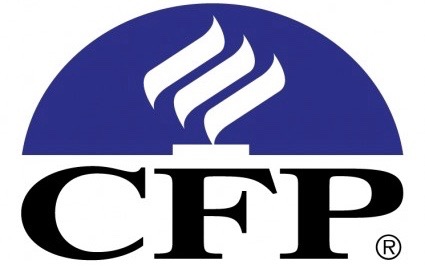Why Plan With a CFP?
 “Certified Financial Planner.” What does that title really mean? When you search for a financial advisor, it means everything. I’m taking just a moment here to explain why my CFP® designation is important to you.
“Certified Financial Planner.” What does that title really mean? When you search for a financial advisor, it means everything. I’m taking just a moment here to explain why my CFP® designation is important to you.
To become a Certified Financial Planner™ practitioner, you must at least have a bachelor’s degree, you must have studied financial planning at a college or university, and completed education requirements in the major personal financial planning areas as defined by the Certified Financial Planner Board of Standards. You must also pass a 6-hour exam (kind of like a bar exam), which covers financial planning, tax planning, employee benefits and retirement planning, estate planning, investment management, and insurance topics.1,2
There are ethical and experiential standards to meet as well. Before you can be credentialed as a CFP®, you must pass a strict ethics review and agree to work by the CFP Board's Standards of Professional Conduct. As a CFP® practitioner, you must put the interests of the client first and act “fairly and diligently” when providing financial planning advice and services. Those services must be based on the client’s needs and delivered with objectivity and integrity. You must also have 6,000 or more hours of experience related to financial planning (or 4,000 hours of apprenticeship experience that must satisfy additional criteria) before you can earn the CFP® certification.3,4
I should also point out that as a CFP® certificant, I must be recertified every two years. That requires 30 hours of continuing education, so that I can stay informed of the latest developments affecting the financial planning profession. The CFP Board stipulates that two of these 30 hours must be spent studying ethics.5
This is why I chose the CFP® designation.
Many people today call themselves “financial planners” without having this kind of experience and knowledge. Many of them work with a sales-based mentality. Often, they will suggest an investment product as a financial solution. Quite often, they get a nice commission off the sale of that product.
CFP® practitioners know that investments are simply components in an overall financial plan, not financial solutions in themselves. We have the education and experience to create integrated financial plans using not only investments, but also strategies for tax reduction, wealth accumulation, wealth preservation, and tax-efficient wealth transfer. We have the knowledge to plan for the long-term goals of our clients and the experience to implement, oversee, and revise these plans through the years.
If someone you know is searching for financial planning advice, please let them know that you know a Certified Financial Planner™ practitioner. You may refer them to me. Just have them call David at (715) 635-3136, or simply have them email me at david@davidpford.net. I will be happy to meet them and act by the CFP® code in their best interest.
1 - cfp.net/become-a-cfp-professional/cfp-certification-requirements/education-requirement [6/13/17]
2 - cfp.net/become-a-cfp-professional/cfp-certification-requirements/cfp-exam-requirement/about-cfp-exam [6/13/17]
3 - cfp.net/become-a-cfp-professional/cfp-certification-requirements/ethics-requirement [6/13/17]
4 - cfp.net/become-a-cfp-professional/cfp-certification-requirements/experience-requirement [6/13/17]
5 - cfp.net/for-cfp-professionals/continuing-education [6/13/17]
